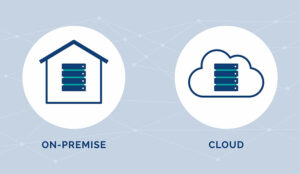The call centre is an essential function for any business that requires a reliable communication solution to handle its customers’ requests. Call centres are typically responsible for inbound and outbound calls, emails, numbers, social media, and other communication channels.
They are often referred to as contact centres or call centres, and they can be used for different purposes such as lead generation, customer support, sales, customer satisfaction, etc.
Call centre software is the primary tool used to manage and process calls in call centres. Call centre software is designed to help businesses manage inbound and outbound communications and provide a better customer experience.
Call centre software is also known as contact centre software, telephony software, or computer-telephony integration software.
- SaaS call centre vs traditional call centres
- Cloud-based call centre: for what business sizes?
- The advantages of SaaS or cloud-based call centres
- Cloud contact centre and key features
- The cloud call centre and the customer experience
1. SaaS Call Centre vs Traditional Call Centres
The SaaS call centre is a cloud-based call centre solution that has become increasingly popular in recent years. SaaS stands for “Software as a Service,” which means the software is hosted on the service provider’s website and accessed by customers through a web browser.
Cloud-based call centres have become popular due to the advantages they offer over traditional call centres.
Cloud-based call centres are more cost-effective, scalable, and flexible than traditional call centres. Cloud-based call centres are also quicker to set up, allowing businesses to start offering customer service quickly.
2. Cloud-Based Call Centre: For What Business Sizes?
Cloud-based call centres are also more convenient for companies that need to manage a large volume of calls, as they can easily adapt the service to meet the company’s needs.
The cloud call centre also allows companies to benefit from continuous software updates, meaning they have access to the latest features and technologies.
Cloud-based call centres can be used by all types of businesses, from small to large. Companies can choose the SaaS call centre that best suits their business based on their budget, number of employees, and feature needs.
3. The Advantages of SaaS or Cloud-Based Call Centres
Cloud-based call centres have many advantages for businesses. The benefits of SaaS call centres include:
Cost Reduction:
Cloud-based call centres are more cost-effective than traditional call centres. Companies do not need to purchase and maintain their own equipment, reducing infrastructure costs.
Continuous Updates:
Cloud-based call centres are continuously updated, meaning companies have access to the latest features and technologies without having to perform expensive updates themselves.
Flexibility:
Cloud call centres are more flexible than traditional call centres. Companies can easily adapt the service to their needs, and add or remove features as their business evolves.
Scalability:
Cloud-based call centres are scalable, meaning companies can easily increase or decrease their capacity depending on demand. Companies do not need to worry about adding additional equipment to handle a higher load.
Quick Setup:
Cloud-based call centres can be set up quickly, meaning companies can start offering customer service quickly. Companies do not need to wait for their equipment to be installed and configured before using their call centre.
Remote Access:
Cloud-based call centres can be used remotely, meaning employees can access the call centre from anywhere. This allows companies to provide 24/7 customer service without needing to maintain a physical call centre.
Companies can choose the SaaS call centre that best suits their needs based on their budget, number of employees, and feature needs.
4. Cloud Contact Centre and Key Features
Cloud contact centres offer numerous advanced features to help businesses effectively manage their interactions with customers. Here are some of the key features of a cloud contact centre:
Automatic Call Distribution:
Cloud contact centres allow for automatic distribution of calls to available agents, reducing customer wait times and improving satisfaction.
Computer Telephony Integration:
Cloud contact centres enable integration of a company’s phone and computer systems to facilitate call management.
Interactive Voice Response:
Cloud contact centres offer an interactive voice response system that allows customers to easily navigate menu options and quickly find the information they need.
Unified Communications:
Cloud contact centres integrate unified communications to allow customers to communicate with the company in different ways.
Customer Database:
Cloud contact centres have a centralized customer database that allows agents to quickly access the history of interactions with customers to provide personalized service.
Data Analytics:
Cloud contact centres offer advanced analytics tools that allow businesses to track the performance of their contact centre and identify areas for improvement.
Self-Service:
Cloud contact centres allow customers to access self-service information, reducing the volume of incoming calls and improving the efficiency of the contact centre.
These advanced features offered by cloud contact centres enable businesses to provide superior customer service and support and enhance their overall customer experience.
5. The Cloud Call Centre and the Customer Experience
Cloud-based call centres or cloud call centre software allow companies to provide a better customer experience.
Customers can access a SaaS call centre from their computer or mobile phone, which means they don’t have to wait on hold to speak to a representative.
SaaS call centres can also offer Interactive Voice Response (IVR) features to help customers resolve their issues more quickly.
The SaaS call centre, also known as cloud call centre software, can be combined with a variety of other communication tools to offer an optimal customer experience.
For example, native integrations with key CRM and business tools allow for unified and proactive communications with the customer, regardless of channel.
By combining the advantages of SaaS call centres with these tools, companies can improve their customer service and offer an exceptional customer experience.
In summary, SaaS call centres are a cloud-based call centre solution that offers many benefits for businesses. SaaS call centres are more cost-effective, scalable, flexible, and faster to set up than traditional call centres.
Author: Guest Author
Published On: 23rd Oct 2023 - Last modified: 9th Dec 2024
Read more about - Guest Blogs, Diabolocom















